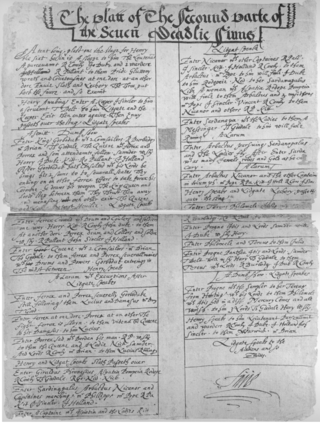Related Research Articles

The earliest texts of William Shakespeare's works were published during the 16th and 17th centuries in quarto or folio format. Folios are large, tall volumes; quartos are smaller, roughly half the size. The publications of the latter are usually abbreviated to Q1, Q2, etc., where the letter stands for "quarto" and the number for the first, second, or third edition published.

Benjamin Jonson was an English playwright and poet. Jonson's artistry exerted a lasting influence on English poetry and stage comedy. He popularised the comedy of humours; he is best known for the satirical plays Every Man in His Humour (1598), Volpone, or The Fox, The Alchemist (1610) and Bartholomew Fair (1614) and for his lyric and epigrammatic poetry. "He is generally regarded as the second most important English dramatist, after William Shakespeare, during the reign of James I."
Philip Henslowe was an Elizabethan theatrical entrepreneur and impresario. Henslowe's modern reputation rests on the survival of his diary, a primary source for information about the theatrical world of Renaissance London.
The King's Men was the acting company to which William Shakespeare (1564–1616) belonged for most of his career. Formerly known as the Lord Chamberlain's Men during the reign of Queen Elizabeth I, they became the King's Men in 1603 when King James I ascended the throne and became the company's patron.
John Heminges was an actor in the King's Men, the playing company for which William Shakespeare wrote. Along with Henry Condell, he was an editor of the First Folio, the collected plays of Shakespeare, published in 1623. He was also the financial manager for the King's Men.
Henry Condell was a British actor in the King's Men, the playing company for which William Shakespeare wrote. With John Heminges, he was instrumental in preparing and editing the First Folio, the collected plays of Shakespeare, published in 1623.
City comedy, also known as citizen comedy, is a genre of comedy in the English early modern theatre.

Sejanus His Fall, a 1603 play by Ben Jonson, is a tragedy about Lucius Aelius Sejanus, the favourite of the Roman emperor Tiberius.

John Lowin was an English actor.

A boy player was a male child or teenager who performed in Medieval and English Renaissance playing companies. Some boy players worked for adult companies and performed the female roles, since women were not allowed to perform on the English stage during this period. Others worked for children's companies in which all roles, not just the female ones, were played by boys.
Augustine Phillips was an Elizabethan actor who performed in troupes with Edward Alleyn and William Shakespeare. He was one of the first generation of English actors to achieve wealth and a degree of social status by means of his trade.
Thomas Pope, also credited as Thomas Poope in the First Folio, was an Elizabethan actor, a member of the Lord Chamberlain's Men and a colleague of William Shakespeare. Pope was a "comedian and acrobat."
William Ecclestone or Egglestone was an actor in English Renaissance theatre, a member of Shakespeare's company the King's Men.
William Ostler was an actor in English Renaissance theatre, a member of the King's Men, the company of William Shakespeare.

The Seven Deadly Sins was a two-part play written c. 1585, attributed to Richard Tarlton, and most likely premiered by his company, Queen Elizabeth's Men. The play drew upon the medieval tradition of the morality play; though it was very popular in its time, no copy of either part has survived.
John Shank was an actor in English Renaissance theatre, a leading comedian in the King's Men during the 1620s and 1630s.
John Underwood was an early 17th-century actor, a member of the King's Men, the theatrics company of William Shakespeare.
William Stansby (1572–1638) was a London printer and publisher of the Jacobean and Caroline eras, working under his own name from 1610. One of the most prolific printers of his time, Stansby is best remembered for publishing the landmark first folio collection of the works of Ben Jonson in 1616.
Thomas Savage of Rufford, Lancashire, was a member of the Worshipful Company of Goldsmiths and one of the ten seacoal-meters in London. Together with William Leveson, he was one of two trustees used by the original shareholders of the Globe Theatre in the allocation of their shares in 1599. He was an associate of the actor and editor of the First Folio, John Heminges, and of John Jackson, both of whom were Shakespeare's trustees in the purchase of the Blackfriars Gatehouse. Savage amassed a considerable fortune, at the time of his death owning five houses in London and an inn called the George.
Robert Gough, also Goughe or Goffe, was an English actor who took female parts in Shakespeare's plays. He was the father of actor Alexander Gough.
References
- ↑ E. K. Chambers, The Elizabethan Stage, 4 Volumes, Oxford, Clarendon Press, 1923; Vol. 2 pp. 311–12.
- ↑ Kathman, David (2005). "How Old were Shakespeares Boy Actors?". Shakespeare Survey. 58: 220–247. doi:10.1017/ccol0521850746.021. ISBN 9781139052771.
- ↑ Kathman, David (2004). "Reconsidering the Seven Deadly Sins". Early Theatre. 7 (1). doi: 10.12745/et.7.1.669 .
- ↑ F. E. Halliday, A Shakespeare Companion 1564-1964, Baltimore, Penguin, 1964; pp. 114–15.
- ↑ E. K. Chambers, The Elizabethan Stage, 4 Volumes, Oxford, Clarendon Press, 1923; Vol. 2 pp. 311–12.
- ↑ "Sacramental Token Books". Archived from the original on 5 December 2014. Retrieved 30 November 2014.
- ↑ Kathman, David (2005). "How Old were Shakespeares Boy Actors?". Shakespeare Survey. 58: 220–247. doi:10.1017/ccol0521850746.021. ISBN 9781139052771.